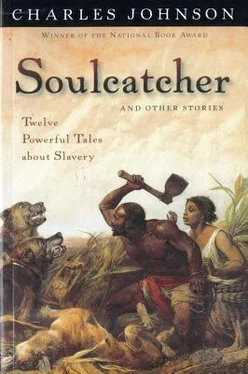I should have known something was wrong.
Two hours later when I climbed under the covers, kissing him on his cheek, I discovered he had no voice at all. He couldn't talk. I rang the bell for Billy Lee, one of our most trustworthy servants, and when he arrived, breathless after running from the kitchen, I told him to saddle a horse immediately and ride to Dr. James Craik's home nearby, and to fetch him, regardless if he'd turned in for the night or not. Poor George could only communicate with me in writing. He took a quill, paper, and ink from his study, smiled at me, and scrawled, Not to worry, James will fix me up. If he forces me to stay in bed, do remember to have someone see to the lame horse I told you about, and take care ofthe washout in the fields.
Dr. Craik, an old friend, arrived just before midnight. He examined the Old Man, and then looked very grave. Turning to me, he said, "Lady Washington, your husband has a severe case of quinsy. That's an inflammation of the tonsils," he explained, though I knew perfectly well what quinsy was and felt a little miffed by his condescension, but this is a cross women have had to bear from time immemorial, that and living in the shadow of their spouses, of course. He recommended, as was right, that Billy ride all night to Alexandria (By Billy's crabbed expression at this chore I should have seen a portent of things to come) to bring two physicians of his acquaintance to help with cupping the Old Man, which our servant did. The next day Dr. Craik and those two men he'd summoned bled George. I was by his bedside all the while, holding his piebald hand firmly, and I must say that it is to Billy's credit that he never left my side except to jump to any task or errand that Dr. Craik asked of him. Our house servants waited solemnly outside the door, whispering among themselves, in part because I believe they loved the Old Man, and in greater part because all had heard that upon his (and my) death their manumission was promised in our will. They too were god-sent that day. They saw to the chores I was too distracted to discharge, some prayed for my husband's swift recovery, and others wept. Nevertheless, all our ministrations came to nought. At ten o'clock on December 14,1799, the man with whom I'd shared life for forty years — since our wedding when we both were twenty-seven — went on to his reward.
What, I have been wondering, is my reward, now that he's gone?
All over this new country he served indefatigably, flags were lowered when word of his death went abroad. In America's churches, state assemblies, and the government he'd created, there were eulogies, the finest of them coming from Harry Lee — known as "Light Horse Harry" when he served under George during the Revolution — who said my husband was "First in war, first in peace, and first in the hearts of his countrymen." These were beautiful tributes, for which I am thankful. I can even turn an appreciative, albeit amused, smile toward the well-meaning mythmakers who began enlarging his legend before we could properly bury him in Mount Vernon's family tomb, spinning outrageous tales of his throwing a silver dollar across the Rappahannock River (What balderdash!), and that when his father, Augustine, discovered one of his cherry trees cut down, young George confessed to the deed, saying, "I cannot tell a lie." Well, I can tell you this: No one knew the Old Man as well as I did. He could lie, oh yes. He was, after all, a politician. Oh, and if one could see his temper when he was angry! Like Vesuvius, that was. Nor did he have the Olympian self-confidence so many attributed to him, what with the paucity of his education. He was painfully shy with every girl before he met me, possibly because his face bore scars from the smallpox he endured while journeying as a boy with his half-brother Lawrence to the West Indies. He was a slow reader. A poor speller. He was a man of deeds, not ideas. He knew no French at all and thus signed a miserable terms of surrender when he was captured during the battle of Great Meadows. Those are matters I assisted him with — matters of culture — as well as adding five thousand acres to his estate when we wed — indeed, you could say it was seventeen thousand acres, if you count the land now owned by my son. No, he was not perfect, but what woman could have asked for a better companion for these last forty years?
When I was a very young girl, studying the classics, I read that the ancient Greeks honored their Olympic game heroes by knocking out a portion of the wall that protected their city — the heroes stood in that spot for the rest of the day, the idea being that with champions such as them a wall was not needed. On December 14 it felt across this country, and especially at Mount Vernon, that we had lost not only a hero but one of the very foundations of our house. For days after his passing I spoke to no one about the depth of this absence save to my dearest and closest friends. Nor did I speak of how subtly I began to see a change in our servants. At first, I thought the smiles with which they greeted me were simply intended to cheer me a little. Then, ever so slowly, I realized they were smiling too much. And too often. Sometimes when I started to enter the kitchen, I'd stop outside the door, listening to the blacks laughing whilst they prepared my meals, and once our cook told the chambermaid how pleased she was that now she'd never again have to slave all day to prepare the elaborate desserts the Old Man was so fond of. At that point, I strode inside. Seeing me, both women went fussily back to work, ducking their heads, but I saw one of them, I swear, wink at the other.
Strangely enough, the worst among them was Billy Lee. With my husband dead and buried, he started behaving as if he was now the master of Mount Vernon, or at least over the other servants. This would have been impossible, I realized, had George and I not become so dependent upon the blacks. We'd delegated so many household responsibilities to them, and not just in the manor but in the tobacco fields as well, that I would be at pains to tell you the inventory of our kitchen, or how well the Old Man's latest agricultural experiments were proceeding. Ironically, we were enslaved to them, shackled to their industry, the knowledge they'd acquired because we were too busy running the country to develop it ourselves!
One afternoon last week Billy brought me my tea as I was writing thank-you notes to those many people who'd sent me condolences. He actually pointed his dark finger at me, wagged it, and said, "Lady Washington, you should let them scribes the master hired do that." I mean, he was telling me what I should do. More than once I sniffed our best brandy on his breath. I heard him swearing at a stable hand, and do you think he was at all ashamed when I chastised him? Hardly!
It was, then, perhaps a month after the Old Man's death, that I began to fear the Negroes who resided in every nook and cranny of my life. At night, from their quarters, I began to hear drums, which George had expressly forbidden them to play. Food began to disappear from our pantries. Many of our plants died in the greenhouse from neglect. And there I was, an old woman still grieving over the love of her youth, surrounded on all sides by George's slaves who knew that when I expired they were free. (My own servants we had not yet decided about.) Privately, with me and friends, my husband declared his repugnance for slavery. He knew it was wrong. And hoping to right that wrong — one he'd known as a slave master since his eleventh year — he built liberation for his Negroes after my death into his last will and testament. (No, I was not thoroughly consulted on this matter.) And by doing so, he created the most frightening prison for me.
Читать дальше












